- Home
- Kristi Belcamino
Dead Wrong Page 2
Dead Wrong Read online
Page 2
I keep brushing until I hear my mother call me down to breakfast. Cringing at that familiar note of pleading in her voice, I head downstairs, steeling myself to act normal and eat my breakfast. I’ve already broken my mother’s heart once. I’m not going to do it again.
CHAPTER THREE
Downstairs at the kitchen table, I use my fork to saw off another piece of waffle, shove it in my mouth and chew it into smithereens. It tastes like cardboard dotted with chocolate chips and a little bit like burnt toast, but I give my mother a small smile. She’s trying not to hover and pretends like she’s not watching me. I know better. I keep chewing and then swallow the dry mess down, taking a small sip of juice to keep from gagging.
Sam must have left. They fought about me. I wish she wouldn’t do that — defend me and fight with Sam over it
“I talked to Beth’s mom again this morning and it looks like the funeral will be Saturday.” My mom’s voice is soft. She has her back turned, reaching on tiptoe to put some plates away on a higher shelf. “They are keeping ... her ... for a few days as part of their investigation.”
An image of Danielle’s body in a coffin shoots into my mind. I don’t want to go to a funeral. I won’t go. No way.
But I know I’m lying to myself.
My mom is quiet and I go over what she just told me. Investigation. I’m stuck on that word.
“Investigation? I thought you said she drowned.”
“They’re making sure.”
I think of Danielle’s message. What if it wasn’t an accident? Was she in some sort of trouble?
My mom patters around the kitchen, noisily banging dishes as she slides open old wooden drawers and put things from the dishwasher away. She seems normal, but her eyes betray her. She casts sideways glances at me, eyes darting from my plate to my face, trying to avoid looking obvious. I saw off another piece of waffle with my fork and chew, chew, chew.
She slouches down onto the red vinyl seat of the chair beside me. “Oh honey, I’m so sorry about Danielle. Do you want to talk about it? You know that’s what Dr. Shapiro says is the healthy thing to do. We’re both not so good at that, are we? But we’re learning. I’m trying, honey, really, I’m trying.”
“I know, Mama. It’s okay.” I pat her hand. I notice for the first time that she has small brown spots. Tiny crinkles sprout out from her green eyes and small lines are like commas on each side of her mouth even when she doesn’t smile. But to me, she’s beautiful.
Her eyes search mine, so I look away, concentrating on cutting my next bite of waffle. I even squirt another dollop of whipping cream on top because I know that makes her happy.
She tries again. “It’s just that ... you don’t seem very ...” She stands and gives a big sigh. “It’s okay to cry about it, honey. You know that’s what Dr. Shapiro said caused all your ... in the first place.”
My what? My mother still won’t say the words out loud.
But she’s right. We suck at expressing our feelings in this family. I know what Dr. Shapiro thinks. She thinks my inability to deal with my parent’s divorce was what set the ball rolling. Maybe she’s right. But that was a long time ago. I’m older now. I’ve learned a lot since them. Haven’t I? So why can’t I cry? My oldest and best friend is dead. It doesn’t matter that we’ve been on the outs.
I still don’t know why she had stopped answering my calls and started ignoring me at school when we started ninth grade. Was I not cool enough for her and her new popular friends? I don’t know. And now I’ll never know.
But I could’ve known. If only I’d answered my phone. The call from her the other day I had angrily ignored, thinking, let her wait, thinking I was punishing her for abandoning our friendship.
My stomach, which already feels bloated from the waffle, hurts like I got punched in the gut. I’ve missed my chance to repair our friendship. Now, it’s too late. She’s dead.
“If you want, you don’t have to go to school today,” my mom says. “I can take the day off work.”
For a minute, the idea is tempting, but I know we can’t afford it.
“No, that’s okay. I have a paper due anyway.”
The phone rings and my mother heads to answer it. In two seconds, I quickly scrape the last of my waffle from my plate. Even though less than a bite of my waffle is left, I bury it under other trash in the garbage can. It doesn’t mean anything, I tell myself. It’s just a habit.
CHAPTER FOUR
I sit in my usual seat on the city bus, right behind the bus driver. I fiddle with my dented iPod and only relax when the sounds of Johnette Napolitano’s voice filters out. I’ve memorized every Concrete Blonde song. I try not to sing the words in my head, afraid I’ll accidentally sing them out loud and everyone on the bus will think I’m a weirdo.
After Danielle and I had a falling out in ninth grade, I’d become friends with a girl named Miranda Bond who had just moved to our school. Everyone ignored her for the first few weeks because she was overweight and had acne and wore unstylish clothes. But she was my lab partner in science and by the end of the third week of school we discovered we had a lot in common.
We went to old black-and-white movies at the Uptown Theater and spent lunch discussing Anais Nin and Henry Miller and dreaming of moving to Paris when we graduated.
But Miranda moved to Nebraska over spring break this year.
Since then I’d been spending my lunch hours in empty classrooms reading.
I pat my tote bag on the bench beside me I always keep it close because it has my sketchbook in it. My sketches are the one things I can’t replace.
The bus glides to a stop a few blocks later and a nasty smell floats by me. I look down at my scuffed Converse sneakers, remembering how last night they had vomit splashed on them. I hope they don’t smell like puke. I don’t see anything on them now. I avoid eye contact with a group of guys in baggy jeans and stocking caps who get on board, swearing and swaggering as they walk down the aisle. One drags his finger along the edge of my seat. I don’t look up.
The bus pulls away from the curb at the same time I hear the group in the back start up. The voices are loud and angry. I only catch snatches of the conversation, trying not to look.
A woman wearing a scarf over her head and long skirt stumbles to the front of the bus, carrying heavy tote bags that droop to the ground.
The boys in the back get louder. “That smells nasty. Whatever you have in that bag is foul. Go back to your own country.”
The woman’s mouth becomes small and she darts glances to the side. Nobody makes eye contact. People look at their shoes or out the window. An older man scoots over to make room, but freezes when one of the guys in the back of the bus shouts, “She doesn’t deserve a seat on the bus. Her family is probably the ones that killed my brother over in Afghanistan.”
The woman stares at the floor.
I grab my tote bag and stand, pointing that she should take my seat.
“I said, ‘she needs to stand.’” The voice from the back of the bus sends a shiver down my back, but I ignore it.
I gesture to my seat and the woman folds herself into it. I hold onto the metal bar, staring out the window. Out of the corner of my eye, I spot one of the guys in the back stand and start to take a few steps toward me. I hold my breath, making eye contact with the bus driver who is watching in his mirror.
The guy is at my elbow right when the bus pulls over at a stop and he lurches into me, exaggerating the movement of the bus, knocking me down. He stands over me laughing. I’m sprawled on my back, propped up on my elbows and something about his cackle sends a wave of fury through me. I kick at his ankles with my heels like I’m frantically pedaling a bike out of hell. All my anger and frustration at Danielle being dead is channeled into my kicks. Someone yanks me up by my armpits. Across from me, the guy’s friends have tugged him away. He scowls at me.
“You’re one crazy bitch!”
He and his friends pile out the back door of the bus, with him givi
ng me one last glance.
The entire bus relaxes. Whoever is holding me lets go and I clutch the metal bar until my hand hurts.
At the next stop, the woman in the scarf stands, gives me a small smile and gets off the bus, so I sit back down. A guy with a buzz cut and tattooed arms poking out of his short-sleeve dress shirt boards the bus and sits beside me. I don’t meet his eyes, but get a whiff of his guy smell — deodorant and cigarette smoke.
I’m scared the tears will finally come now, in public, the last place I want to cry. But they stay away. I turn my body away from the guy with the buzz cut. I press my face to the window and stare at the neighborhood whizzing by.
Outside the dirty window, I take in what has become a familiar sight — beater cars pulled up onto front yards with more clumps of dirt than grass. Sagging front porches piled with old armchairs and toys. Mangy looking dogs chasing each other. Strip malls with Laundromats and pawnshops and hair salons.
Danielle is dead. The words seem meaningless. I close my eyes. An image of Danielle bobbing in the water appears and my eyes snap open. Anything but that.
Ten minutes later, the scenery changes as we drive through my old neighborhood. Perfect manicured lawns and flower beds. Giant Victorian houses with columns and old-fashioned swings on the front porch. Shady boulevards. Stretches of business districts with gourmet coffee shops and boutiques.
I pull the cord and get off a few blocks from my high school.
CHAPTER FIVE
Coming to school was a mistake.
It’s even worse than the day I came back after being in the hospital in ninth grade. On that day, there was plenty of whispering and staring. But the worst part was Danielle walked right past me in the halls with her new crowd. I stopped, confused, and called her name, but she didn’t even look over at me.
Within a week, the whispering had turned into name-calling. Not from Danielle, but her friends. She let them call me names, looking down at the floor. If I’d have done that — kept my head down, staring at the floor — they’d probably have gotten bored with harassing me. But I didn’t. When they called me “Skeletor” or “skeleton girl,” I always answered with some random fact completely out of the blue like, “You know, elephants are the only mammals that can’t jump.”
It always took them off guard and left them sputtering.
The first time Danielle’s “new” best friend, Beth, pushed me in the hall, I pushed back and we ended up on the ground throwing wild punches. We also ended up suspended for fighting. The suspension meant a welcome day at home for me, but it had gotten Beth kicked off the cheerleading squad. Ever since then, Beth has had it out for me.
Today, I’m walking toward my locker, weaving in and out of the crowd, keeping my eyes straight in front of me when way down the hall I see a small crowd gathered around Beth. Even from here I can see her red, puffy face. Her friends are patting her back and hugging her.
She is grieving as much as me. As I look around, I see clumps of girls scattered throughout the hall, some crying, some whispering, some staring at me.
Seeing so many people at school mourning Danielle’s death makes my legs wobble. I slump to the ground, putting my back up against the lockers and my hands over my eyes as the sobs come, uncontrollably now.
I ball some of the fabric on my shirt and use it to wipe my eyes. It’s a used tee shirt I found at the thrift store. Wearing second-hand clothes is shunned at Pleasanton High School.
The popular girls at PHS wear Pink and Gucci and Chanel. Danielle, too. Although lately she’d been different. About a month ago, she’d chopped off all her silky hair and begun wearing skintight faux leather pants or small skirts with boots and black fishnet tights. At the time, I wondered if this transformation meant she was breaking away from the popular crowd at school. Now, I think it had to do with that boy in the cap.
Sitting slumped in the hall, the haunting image I’d seen — Danielle’s body bobbing in the lake — reappears in my head. I pull the flannel shirt I’m wearing as a jacket tighter around me, keeping my eyes down as feet and legs pass by.
The sound of feet running to class slowly ebbs until it is silent. I wipe my nose on the undone sleeve of my shirt. Danielle is dead. Her body is going to go in a hole in the ground. I’ll never get to talk to her again. I’ll never get to tell her I’m sorry for not calling her back last week. Oh God, why didn’t I call her back? I thought I was showing her, teaching her a lesson that she couldn’t take my friendship for granted. I was a fool. The truth is I would have always been there for her. No matter what.
And now it’s too late. I cry for another few minutes and then, nothing is left.
“You okay?”
I hadn’t realized someone was standing near me, leaning against the lockers. It’s Curtis Martinez, a guy I’ve known since kindergarten but never really talked to. He hangs out with the theater kids, the ones who wear old man sweaters and vintage velvet tuxedo jackets to school. His legs soaring up from his oversize cowboy boots are toothpicks in black leggings.
I look up and shake my head slowly. I’m not okay.
“Sorry about your friend.”
He must remember Danielle and I were friends in middle school, which feels like a lifetime ago. I nod my thanks and take the hand he offers. He pulls me up.
“Figures I’d start crying at school.” I drag my hand across my face, hoping I’m not spreading snot everywhere.
“Yeah. That sucks.” His lips press together as I remember vaguely some story about one of his friends at another school dying in a car crash a few years ago.
“Great. We’re late,” I say, scanning the empty hall.
He gives me a wry smile. “Wanna skip?”
I’ve never cut class before. But sitting in class right now watching people who barely knew Danielle sob seems unbearable. Even as guilt ripples through me, I agree.
“Let me go blow my nose first,” I say.
In the bathroom, I walk by the mirrored wall and instinctively stop to look at myself. I turn sideways, lift up my shirt, and suck in my stomach. It’s an old habit. I feel guilty doing it but I can’t resist. I know I can’t see clearly what is in the mirror. It’s not reality. Or is it? I know enough to know I can’t tell. That my brain does something weird and makes it so I can’t see how I really look.
That’s why my mom took away my full-length mirror in my room. I still look at my stomach in the mirror, but now I have to go into the bathroom, which is more obvious and more work. I raise my eyes to my face. My eyes seem huge and black, my lips too red, and my brown hair is long and lackluster around my face like a bunch of seaweed. I close my eyes not wanting to face myself anymore.
CHAPTER SIX
Curtis and I sneak out the hall door farthest away from the office and head for a kiddie park across the street from the school. We sit on the swings. I wrap my arms tightly around me. It’s not cold, but I can’t get warm today.
I shake my head when Curtis offers his pack of cigarettes to me. He lights the cigarette dangling from his lip.
“It’s just a clove. I’m going to quit as soon as school is out.” He exhales and squints at me. “I hope this doesn’t sound rude, but didn’t your friend know how to swim?”
His words send an electric jolt through me.
“She was a fish.” I think about his words for a second. “They say she drowned, but my mom says they’re investigating. Whatever that means.”
“Huh.” He taps the ash of his cigarette into the sand and buries it with his foot.
“I was there the night they got her out of the water,” I say.
“Oh man, that’s awful.”
I nod, agreeing. It’s a relief to tell someone. “These gutterpunks were there too and they took them away in a squad car.”
“What?” He exhales a smoke ring and his eyes narrow.
I idly pump my legs so the swing moves a little. “I think she was dating one of them.”
Curtis exhales and twists his swing so it un
winds as he blows smoke out in a circle. “I thought she liked jocks and rich dudes.”
I don’t answer.
We swing for a few minutes in silence. The sky is that springtime in Minnesota deep blue that is so beautiful it nearly hurts to look at. Giant puffy white clouds float overhead. Birds squawk and cars pass by a few streets away. How can the world be so beautiful when my best friend is dead?
I feel guilty for thinking that it’s nice to sit here with Curtis and not feel like I have to talk to fill the emptiness. Every once in a while, I sneak a glance at him. He’s hot in a boy band way. Too bad he bats for the other team.
“Listen,” Curtis stops his swing with a toe in the dirt and turns to me. “My friends and I are having a party Friday night, wanna come?”
I think about it for a minute and then nod.
Curtis fumbles in his rucksack for a minute and scribbles an address on a scrap of paper. The address is in Pleasanton. My old neighborhood. About a block from my old house. The thought of going to a party there fills me with anxiety. The bell at school rings.
“I gotta go,” I say, grabbing my tote bag. “I better not miss chem. You coming?”
Curtis exhales a long puff of smoke. “Nah. I’m meeting someone out here in a few minutes. Catch you later.”
AT LUNCH, I’M HEADED out the cafeteria door with my tray when Curtis grabs my arm.
“Do you like eating by yourself?”
“Sometimes.” I shrug, feeling my face turn pink.
“Today you’re sitting with us.”
I don’t argue, following him over to the table with the theater kids. As I pass Beth’s table she says something and all her friends look at me.
I slide into a seat and Curtis sits beside me. He doesn’t introduce me and I’m relieved. People look at me curiously, but not in a mean way.

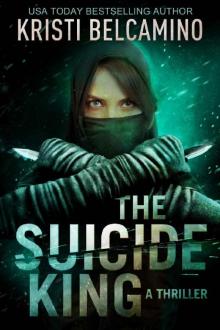 The Suicide King
The Suicide King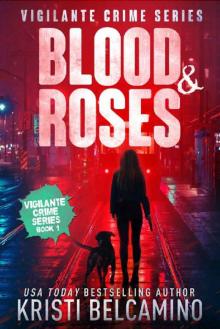 Blood & Roses (Vigilante Crime Series)
Blood & Roses (Vigilante Crime Series)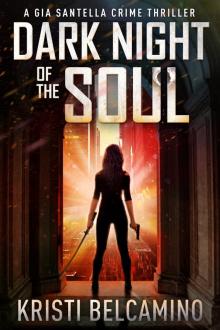 Dark Night of the Soul
Dark Night of the Soul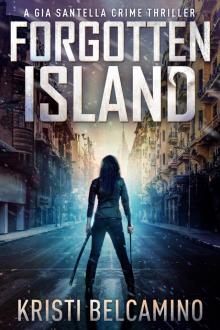 Forgotten Island
Forgotten Island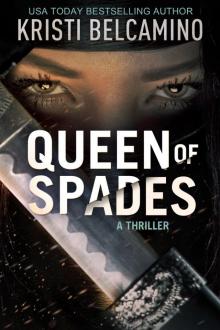 Queen of Spades
Queen of Spades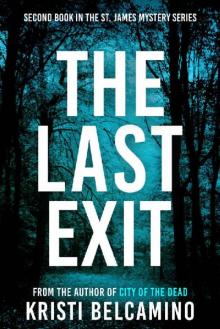 The Last Exit: A St. James Mystery (St. James Mysteries Book 2)
The Last Exit: A St. James Mystery (St. James Mysteries Book 2)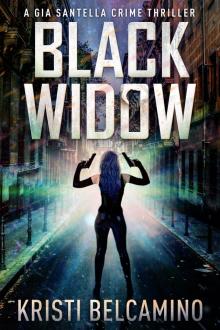 Black Widow
Black Widow Blood & Fire (Vigilante Crime Series Book 2)
Blood & Fire (Vigilante Crime Series Book 2) End Game
End Game Buried Secrets
Buried Secrets Death on Sunset Hill (A Tommy St. James Mystery Novella Book 2)
Death on Sunset Hill (A Tommy St. James Mystery Novella Book 2)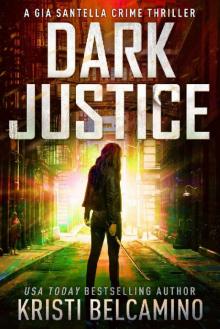 Dark Justice
Dark Justice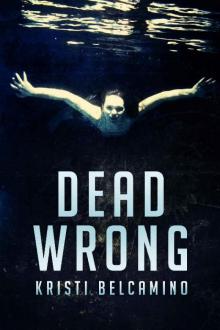 Dead Wrong
Dead Wrong No Way Out
No Way Out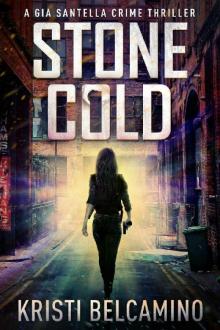 Stone Cold
Stone Cold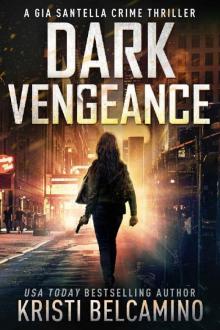 Dark Vengeance
Dark Vengeance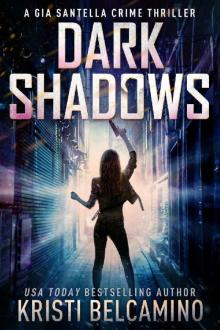 Dark Shadows (Gia Santella Crime Thrillers Book 11)
Dark Shadows (Gia Santella Crime Thrillers Book 11)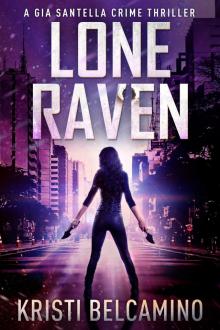 Lone Raven
Lone Raven![[Gia Santella 01.0] Gia in the City of the Dead Read online](http://i1.bookreadfree.com/i/03/16/gia_santella_01_0_gia_in_the_city_of_the_dead_preview.jpg) [Gia Santella 01.0] Gia in the City of the Dead
[Gia Santella 01.0] Gia in the City of the Dead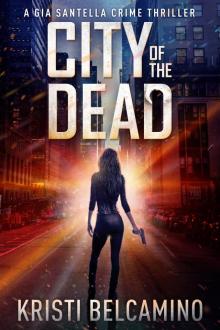 City of the Dead
City of the Dead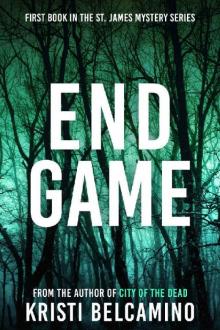 END GAME: A St. James Mystery (St. James Mysteries Book 1)
END GAME: A St. James Mystery (St. James Mysteries Book 1)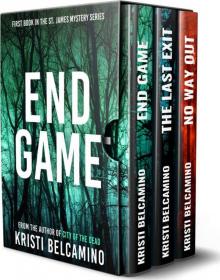 Tommy St James Mysteries Boxed Set
Tommy St James Mysteries Boxed Set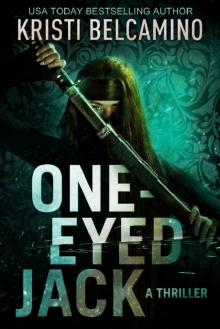 One-Eyed Jack
One-Eyed Jack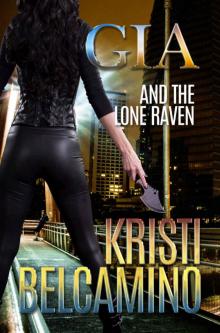 Gia and the Lone Raven
Gia and the Lone Raven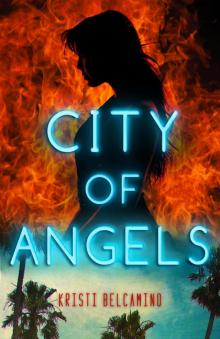 City of Angels
City of Angels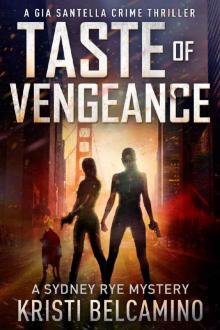 Taste of Vengeance
Taste of Vengeance Gia Santella Crime Thriller Boxed Set: Books 1-3 (Gia Santella Crime Thrillers)
Gia Santella Crime Thriller Boxed Set: Books 1-3 (Gia Santella Crime Thrillers)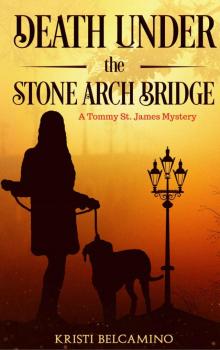 Death under the Stone Arch Bridge
Death under the Stone Arch Bridge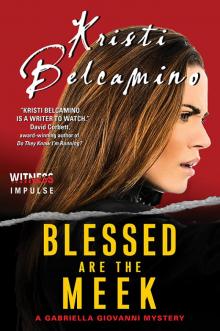 Blessed are the Meek
Blessed are the Meek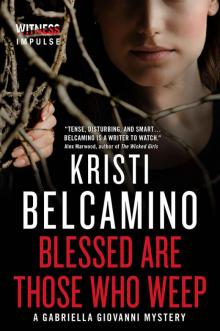 Blessed Are Those Who Weep
Blessed Are Those Who Weep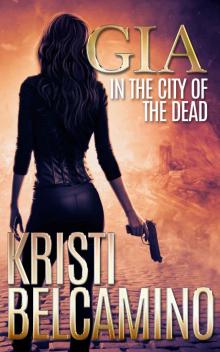 Gia in the City of the Dead
Gia in the City of the Dead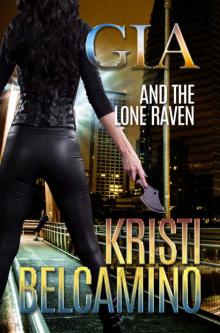 Gia and the Lone Raven (Gia Santella Crime Thriller - Novella Book 4)
Gia and the Lone Raven (Gia Santella Crime Thriller - Novella Book 4) Blessed are the Merciful
Blessed are the Merciful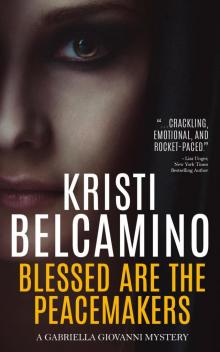 Blessed are the Peacemakers
Blessed are the Peacemakers Gia and the Forgotten Island (Gia Santella Crime Thriller Book 2)
Gia and the Forgotten Island (Gia Santella Crime Thriller Book 2)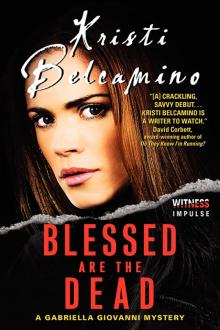 Blessed are the Dead
Blessed are the Dead Death on Sunset Hill
Death on Sunset Hill